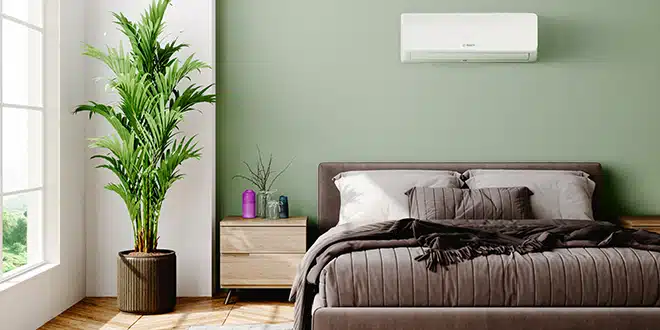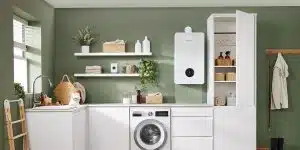UK running costs, savings, and ROI explained
Let’s cut to the chase: you’re probably here because someone’s told you air conditioning is too expensive to run, and you want to know if that’s actually true. Or maybe you’re sweating through another British “heatwave” (yes, 30°C counts now), wondering if installing air con is worth the investment.
We get it. The whole “air conditioning is a money pit” myth has been doing the rounds for years. But here’s the thing – a lot has changed since your mate’s cousin installed that energy-guzzling portable unit back in 2018 and complained about their electricity bill.
Today’s air conditioning systems are completely different beasts. They’re more efficient, more affordable to run, and – here’s the kicker – they can actually save you money compared to traditional heating. Yes, you read that right.
So let’s dive into the real numbers, based on current UK energy prices and actual data from 2024 and 2025, and see what air conditioning really costs to run.
What does it actually cost to run air conditioning in the UK?
The honest answer? It depends on what type of system you choose, but it’s probably less than you think.
Based on current UK electricity rates (around 25.73p per kWh as of July 2025), most air conditioning systems cost between 20p and 70p per hour to run. But that’s a pretty wide range, so let’s break it down:
Split air conditioning systems (the wall-mounted ones):
- High-efficiency models with good SEER ratings: 8p-13p per hour
- Standard 2kW wall-mounted unit: around 49p per hour
- Typical bedroom-sized unit: 21p-27p per hour
Portable air conditioners:
- 1000W portable unit: around 25p per hour
- Larger 12,000 BTU portable unit (3.5kW): around 87p per hour
Here’s a real example: a 2.5kW Mitsubishi air conditioning system costs around 37p per hour to run for heating, whilst a top-of-the-range 35kW gas boiler costs approximately £1.85 per hour.
That’s a massive difference when you’re only heating the room you’re actually using.
How do these costs compare to traditional heating?
This is where things get interesting. While most people think of air conditioning as purely for cooling, modern systems are heat pumps that work brilliantly for heating too.
Gas central heating costs:
- 24kW boiler: £2.76 per hour
- 40kW boiler: £4.60 per hour
- 24kW boiler example: £1.78 per hour (based on 7.42p per kWh gas price)
Electric heating:
- Around 27p per kWh, making it the most expensive heating option
- A typical medium house using 13,500 kWh annually: around £3,645 per year
Air conditioning for heating:
- Can save up to 40% per year on energy bills compared to gas central heating
- Approximately 30-40% cheaper than gas central heating and 50-60% cheaper than electrical heating
The secret sauce? Air conditioning systems are incredibly efficient. Heat pumps typically generate three times the amount of heat output for one unit of electrical input, making them far more efficient than traditional electric heaters.
Real-world running costs: what you’ll actually pay
Let’s get practical. Here are some real scenarios based on current UK energy prices:
Cooling a bedroom in summer: Using a 2.5kW split system for 8 hours overnight during a heatwave:
- Efficient model (averaging 0.4kWh): 8p × 8 hours = 64p per night
- Standard model (1kWh): 25p × 8 hours = £2.00 per night
A typical 12,000 BTU split system running 8 hours daily during summer (June-September) costs approximately £150-£250 for the entire season.
Heating a home office in winter: Instead of heating your whole house, just heat your office:
- High-efficiency air con unit: 27p-30p per hour
- Running overnight for 8 hours: just over £2 per night
Compare that to heating your entire house with gas central heating, which could easily cost £5-10 per day during winter.
Whole-house heating with multi-split systems: A multi-split unit for heating and cooling a house with five rooms costs around £900 per year to run, compared to typical gas central heating bills that can easily exceed £1,500-2,000 annually.
What affects your actual costs?
Several factors determine whether you’ll be at the lower or higher end of these ranges:
Energy efficiency rating: This is huge. A+++ rated units can reduce running costs by 20-30% compared to standard models, while older or poorly maintained systems may cost 50% more.
How you use it: Setting your thermostat to 22-24°C rather than 18°C can reduce energy consumption significantly. For every 1°C you increase the thermostat, you could save £100 per year.
Your home’s insulation: A well-insulated room with double-glazing means your AC doesn’t have to work as hard or run for as long, directly reducing costs.
Your electricity tariff: Current UK electricity prices range from 25.73p per kWh, but your actual rate depends on your supplier and tariff. Shopping around for better rates directly reduces your running costs.
The return on investment: is air conditioning worth it?
Here’s where the numbers get really compelling. While the upfront cost of air conditioning might seem steep (typically around £2,250 per room for professional installation), the long-term savings can be substantial.
Energy savings potential:
- Switching to air conditioning for heating can save up to 40% per year on energy bills
- Heat pump air conditioning systems can save thousands of pounds off your fuel bill annually
- Energy-efficient models may have higher upfront costs but offer substantial long-term savings on energy bills
Typical ROI figures: Air conditioning installations typically provide an ROI of 35-50%, though this varies based on your specific situation and energy usage patterns.
Real-world example: Let’s say you install a £3,000 air conditioning system that saves you £600 per year on heating costs (a conservative estimate based on the data above). You’d break even in 5 years, and everything after that is pure savings.
Factor in rising energy costs and the system’s 15-20 year lifespan, and the savings become even more compelling.
Breaking down the total cost of ownership
When calculating whether air conditioning makes financial sense, you need to consider more than just running costs:
Installation costs:
- Split systems: £2,000-£4,500 for most homes
- Professional installation is essential for efficiency and warranty coverage
Maintenance costs:
- Annual servicing: £150-£200 depending on system size and location
- Annual service is usually required to keep manufacturer warranty valid
Government incentives:
- Domestic installations benefit from reduced VAT rate of 5%
- Various government incentives include interest-free loans and Enhanced Capital Gains schemes for businesses
How to minimise your air conditioning costs
Choose the right system: Split systems are significantly more energy-efficient than portable units, which often cost double to run for equivalent cooling.
Size it properly: An oversized or undersized system will cost more to run. Professional sizing is essential.
Invest in efficiency: While energy-efficient models have higher upfront costs, the long-term savings on energy bills can be substantial.
Smart controls: Use smart thermostats and scheduling to avoid wasted energy. Wi-Fi-enabled models allow precise usage control.
Regular maintenance: Clean filters monthly – clogged filters make your unit work harder, increasing costs by up to 15%.
The bottom line: what air conditioning really costs
Here’s what the numbers tell us about air conditioning in the UK:
Daily cooling costs: For most homes, expect to pay £1.60-£4.00 per day during hot weather for comfortable cooling.
Heating savings: Using air conditioning for heating specific rooms can cut your heating bills by 30-40% compared to gas central heating.
Annual costs: A typical split system costs £150-250 for a full summer season, whilst providing year-round climate control.
Payback period: Most systems pay for themselves within 5-8 years through energy savings, then continue saving money for another 10-15 years.
Total cost of ownership: When you factor in energy savings, reduced maintenance compared to gas boilers, and increased home comfort, modern air conditioning often costs less than traditional heating systems over its lifetime.
The reality is that air conditioning has moved far beyond being an expensive luxury. With rising summer temperatures, changing work patterns (hello, home offices), and increasingly efficient technology, it’s becoming a smart financial choice for many UK homeowners.
The key is choosing the right system for your needs and working with a professional air conditioning installer who can help you maximise efficiency and minimise costs. Because when it’s done right, air conditioning doesn’t just keep you comfortable – it can actually save you money.
Want to explore air conditioning options for your home? Get in touch with our team for a free, no-obligation consultation. We’ll help you understand exactly what air conditioning would cost to install and run in your specific situation, with no jargon and no pressure – just honest, practical advice from experienced professionals.





